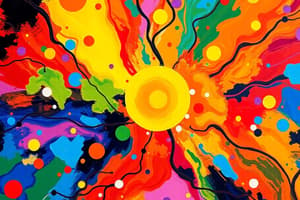Podcast
Questions and Answers
What is the primary source of energy for living cells?
What is the primary source of energy for living cells?
- Electron transport chain
- Oxidation of proteins
- Redox chain
- Oxidation of carbohydrates and lipids (correct)
What is the purpose of the redox chain in living cells?
What is the purpose of the redox chain in living cells?
- To oxidize hydrogen
- To reduce oxygen to water
- To liberate energy in small, usable amounts (correct)
- To generate massive amounts of energy
What has the highest electron affinity?
What has the highest electron affinity?
- Hydrogen
- Oxygen (correct)
- Lipids
- Carbohydrates
What is the final common pathway for electron transfer in aerobic cells?
What is the final common pathway for electron transfer in aerobic cells?
What is the byproduct of the reaction between hydrogen and oxygen?
What is the byproduct of the reaction between hydrogen and oxygen?
What is the purpose of the electron transport chain?
What is the purpose of the electron transport chain?
What is the role of NADH+ and FADH2 in cellular respiration?
What is the role of NADH+ and FADH2 in cellular respiration?
Why is it necessary to transfer hydrogen in steps through the redox chain?
Why is it necessary to transfer hydrogen in steps through the redox chain?
What happens to the protons pumped through Complexes I, III, and IV?
What happens to the protons pumped through Complexes I, III, and IV?
What is the role of Complex V in the electron transport chain?
What is the role of Complex V in the electron transport chain?
What is the net result of oxidative phosphorylation from NADH?
What is the net result of oxidative phosphorylation from NADH?
What is the effect of inhibitors of the electron transport chain?
What is the effect of inhibitors of the electron transport chain?
What is the site of action for antimycin A?
What is the site of action for antimycin A?
What is the function of F0-F1 channel in ATP synthase?
What is the function of F0-F1 channel in ATP synthase?
What is the effect of uncouplers on oxidative phosphorylation?
What is the effect of uncouplers on oxidative phosphorylation?
What is the net result of oxidative phosphorylation from FADH2?
What is the net result of oxidative phosphorylation from FADH2?
What is the final acceptor of electrons and protons in the respiratory chain?
What is the final acceptor of electrons and protons in the respiratory chain?
Which enzyme complex is also known as ATP synthase?
Which enzyme complex is also known as ATP synthase?
Which coenzyme is associated with Complex II?
Which coenzyme is associated with Complex II?
What is formed when electrons combine with oxygen and protons?
What is formed when electrons combine with oxygen and protons?
Which enzyme is found in Complex I?
Which enzyme is found in Complex I?
Which complex contains cytochrome a + a3?
Which complex contains cytochrome a + a3?
What is the role of cytochrome C oxidase in the electron transport chain?
What is the role of cytochrome C oxidase in the electron transport chain?
What is the result of coupling oxidation and phosphorylation in the electron transport chain?
What is the result of coupling oxidation and phosphorylation in the electron transport chain?



